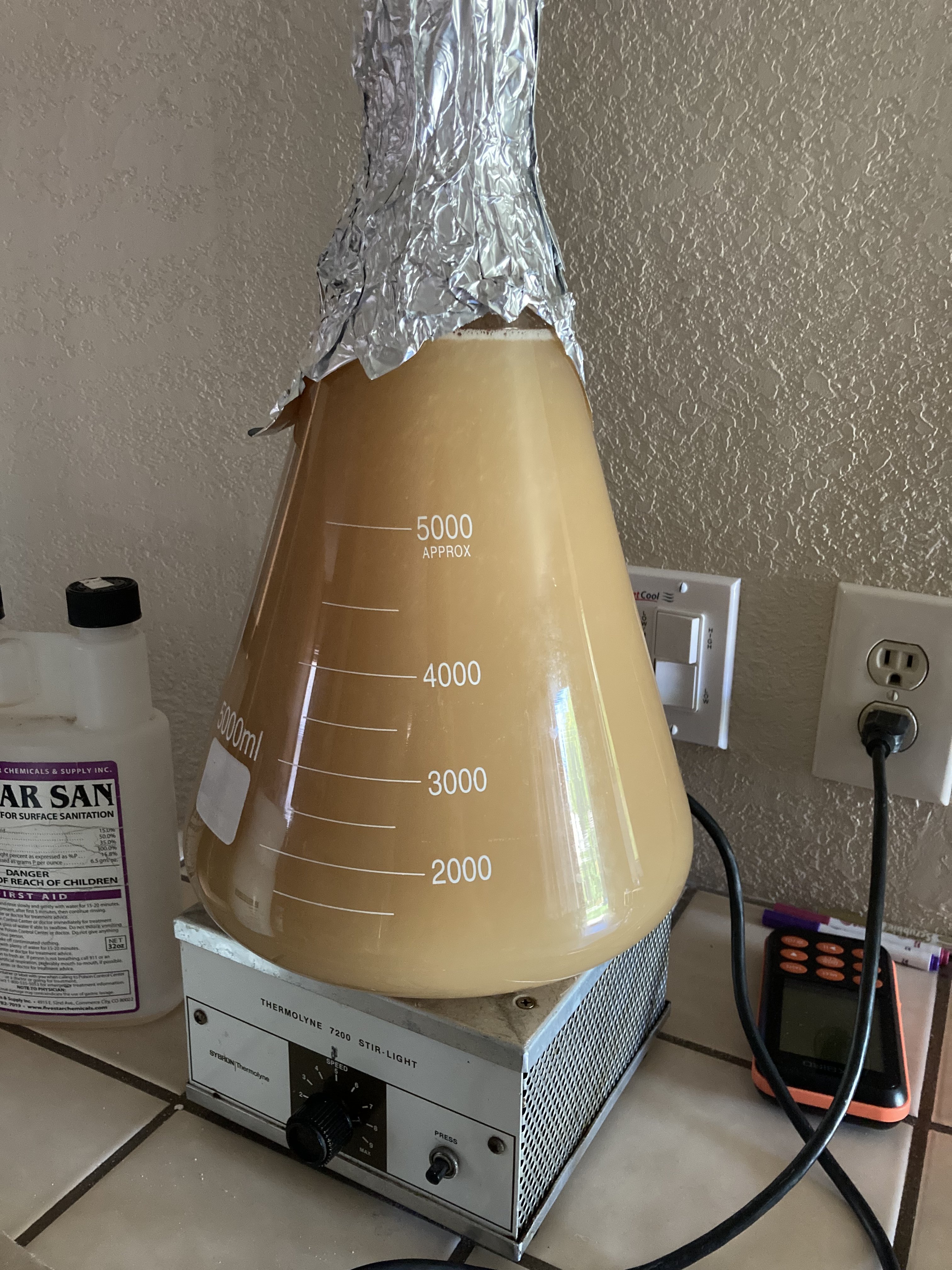Just wondering, what is the best thing to do when making a starter and you know the yeast will overflow? I knew my yeast was going to go crazy (White Labs London Fog) on my last starter so I used a 4L fermenter instead of my 2L flask. Anyways I had about 1.5 L of starter in the 4L fermenter on the stir plate thinking "no way this will overflow", well I'm certain one can guess what happened. Thankfully it wasn't a huge overflow, but it still did over flow. So what should one do when making a starter with yeast that will overflow? Thanks in advance!
You are using an out of date browser. It may not display this or other websites correctly.
You should upgrade or use an alternative browser.
You should upgrade or use an alternative browser.
What to do when you know yeast starter will overflow?
- Thread starter TkmLinus
- Start date

Help Support Homebrew Talk:
This site may earn a commission from merchant affiliate
links, including eBay, Amazon, and others.
Add a drop of Fermcap-s to keep the foam down.
apache_brew
Well-Known Member
Ditto. Add a few drops during the boil. That’s how I boil 6 liters in a 5 liter Erlenmeyer flask without a volcano on my stove top. The ferm cap sticks around and will keep Krausen in line after you pitch the yeast.Add a drop of Fermcap-s to keep the foam down.
Just ordered a bottle. Thanks!Add a drop of Fermcap-s to keep the foam down.
I've finally learned to put the stirplate in a plastic pan before starting it to keep from having to clean up messes, it still might overflow, but the mess is contained.
I need to start doing this, and putting the stir plate inside a freezer bag...I've finally learned to put the stirplate in a plastic pan before starting it to keep from having to clean up messes, it still might overflow, but the mess is contained.

$10.99 ($31.16 / Ounce)
Hornindal Kveik Yeast for Homebrewing - Mead, Cider, Wine, Beer - 10g Packet - Saccharomyces Cerevisiae - Sold by Shadowhive.com
Shadowhive

$58.16
HUIZHUGS Brewing Equipment Keg Ball Lock Faucet 30cm Reinforced Silicone Hose Secondary Fermentation Homebrew Kegging Brewing Equipment
xiangshuizhenzhanglingfengshop

$53.24
1pc Hose Barb/MFL 1.5" Tri Clamp to Ball Lock Post Liquid Gas Homebrew Kegging Fermentation Parts Brewer Hardware SUS304(Liquid Hose Barb)
yunchengshiyanhuqucuichendianzishangwuyouxiangongsi

$44.99
$49.95
Craft A Brew - Mead Making Kit – Reusable Make Your Own Mead Kit – Yields 1 Gallon of Mead
Craft a Brew

$7.79 ($7.79 / Count)
Craft A Brew - LalBrew Voss™ - Kveik Ale Yeast - For Craft Lagers - Ingredients for Home Brewing - Beer Making Supplies - (1 Pack)
Craft a Brew

$159.50 ($26.58 / Count)
3M High Flow Series System BREW120-MS, 5616001, For Brewed Coffee and Hot Tea, Valve-in-Head Design
Amazon.com

$20.94
$29.99
The Brew Your Own Big Book of Clone Recipes: Featuring 300 Homebrew Recipes from Your Favorite Breweries
Amazon.com

$176.97
1pc Commercial Keg Manifold 2" Tri Clamp,Ball Lock Tapping Head,Pressure Gauge/Adjustable PRV for Kegging,Fermentation Control
hanhanbaihuoxiaoshoudian

$53.24
1pc Hose Barb/MFL 1.5" Tri Clamp to Ball Lock Post Liquid Gas Homebrew Kegging Fermentation Parts Brewer Hardware SUS304(Liquid Hose Barb)
Guangshui Weilu You Trading Co., Ltd

$22.00 ($623.23 / Ounce)
AMZLMPKNTW Ball Lock Sample Faucet 30cm Reinforced Silicone Hose Secondary Fermentation Homebrew Kegging joyful
无为中南商贸有限公司

$33.99 ($17.00 / Count)
$41.99 ($21.00 / Count)
2 Pack 1 Gallon Large Fermentation Jars with 3 Airlocks and 2 SCREW Lids(100% Airtight Heavy Duty Lid w Silicone) - Wide Mouth Glass Jars w Scale Mark - Pickle Jars for Sauerkraut, Sourdough Starter
Qianfenie Direct

$719.00
$799.00
EdgeStar KC2000TWIN Full Size Dual Tap Kegerator & Draft Beer Dispenser - Black
Amazon.com
- Joined
- Jul 12, 2017
- Messages
- 489
- Reaction score
- 422
I use a rubber lid off one of our big bowls set on top of the stir plate, It was thin enough that it didn't mess with the magnet connection to the stir bar and has about a 1/2" lip that contains everything.
jerrylotto
Well-Known Member
My strategy is to never use anything with sugar in my yeast starters. I want oxygen and nutrients in order to give the little beasties a good start in life, but I'm not interested in starting fermentation until it hits the wort. I've never had any problem with foaming and fermentation starts like a shot as soon as I pitch the starter slurry. Plus I have no worry about any flavor additions.
My strategy is to never use anything with sugar in my yeast starters. I want oxygen and nutrients in order to give the little beasties a good start in life, but I'm not interested in starting fermentation until it hits the wort. I've never had any problem with foaming and fermentation starts like a shot as soon as I pitch the starter slurry. Plus I have no worry about any flavor additions.
Anything that has what it needs for the yeast to get started has sugars in it.
Wort has sugars in it, Fast Start which is specifically designed to get the yeast started has sugars in it.
The ideal situation is to have the yeast started and the starter ay high krausen when pitching it into the wort.
jerrylotto
Well-Known Member
I add urea and diammonium phosphate to RO water, no sugars. I could add a little dextrose to my starter to promote growth, but there is plenty in the wort post pitch.
- Joined
- Jul 12, 2017
- Messages
- 489
- Reaction score
- 422
You just buy more yeast then when your pitch count is to low?
jerrylotto
Well-Known Member
I do start with a good cell count. My primary use of a starter is to rehydrate, temperature normalize, and activate dormant cells.
- Joined
- Jul 12, 2017
- Messages
- 489
- Reaction score
- 422
Rehydrate. Gotcha.
jerrylotto
Well-Known Member
Rehydrate if starting with dry - reclaimied yeast from the fridge is where the other two things come in.
- Joined
- Jul 12, 2017
- Messages
- 489
- Reaction score
- 422
I have stopped rehydrating dry yeast. It does take off quicker but with side by side comparisons I've decided that they still finish with in the 2 weeks I have allotted, and apparent attenuation end up the same. Usually start cold crashing late on the 11th day, gelatin day 12( depending on style), keg on day 13 brew again on day 14. I think the OP is referring to building up his cell count via recommendations from something like Mr. Malty so not to have to buy more liquid yeast for brews over 1.060 sg.
jerrylotto
Well-Known Member
So you brew ales exclusively? I brew both ales and lagers and always rehydrate and/or reactivate lager yeast. The temperature difference between ideal activation and ideal fermentation is about 20 degrees F.
- Joined
- Jul 12, 2017
- Messages
- 489
- Reaction score
- 422
Yes on ales exclusively( kind of ). I do have a number of beers which I consider hybrid where I might use a lager yeast for the flavor profile and ferment around 50 degrees Fahrenheit but I typically will throw in some US-05 to finish things out, never had any problems with diacetyl doing it this way. It is rare when I need to go longer than my typical time frame but it does happen from time to time especially on huge SG beers. I don't have the patience to let a beer sit around lagering taking up space. Lol. The beer I've got sitting around in barrels is bad enough.
Ditto. Add a few drops during the boil. That’s how I boil 6 liters in a 5 liter Erlenmeyer flask without a volcano on my stove top. The ferm cap sticks around and will keep Krausen in line after you pitch the yeast.
Doesn't a 5L flask only hold 5L?
apache_brew
Well-Known Member
Doesn't a 5L flask only hold 5L?

apache_brew
Well-Known Member
Gotta love Fermcap
That is rehydration, not a yeast "starter". A starter is a process for prepitch cell count growth and it needs sugar.I do start with a good cell count. My primary use of a starter is to rehydrate, temperature normalize, and activate dormant cells.
Similar threads
- Replies
- 13
- Views
- 988
- Replies
- 138
- Views
- 11K




























![Craft A Brew - Safale BE-256 Yeast - Fermentis - Belgian Ale Dry Yeast - For Belgian & Strong Ales - Ingredients for Home Brewing - Beer Making Supplies - [3 Pack]](https://m.media-amazon.com/images/I/51bcKEwQmWL._SL500_.jpg)

















